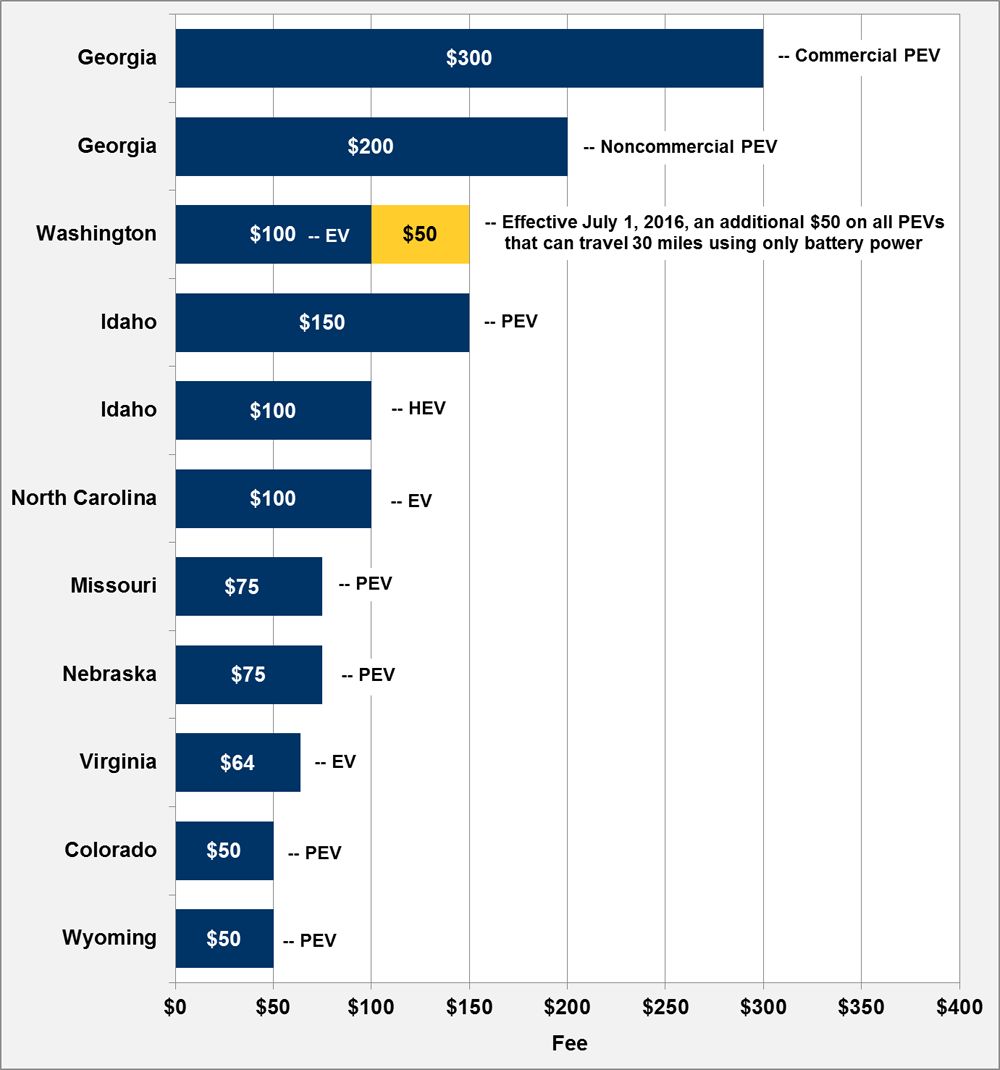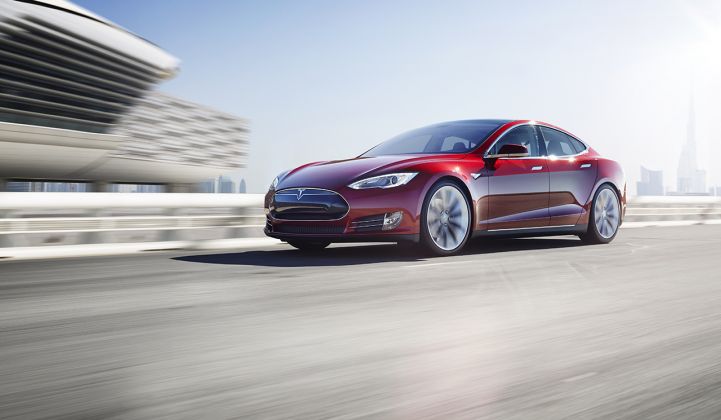The gas tax is catching up to electric vehicles in a growing number of states.
Several states have passed or enacted new fees this year, bringing the total to 17.* Recent additions include West Virginia, Michigan, Minnesota, Indiana, Oklahoma, Tennessee and California, which is home to leading EV maker Tesla and a suite of policies designed to incentivize electric-car adoption. South Carolina enacted a biennial fee for electric cars.
The following nine states passed or implemented EV fees in previous years: Georgia, Washington, Wyoming, Idaho, Colorado, Missouri, Nebraska, North Carolina and Virginia (see chart below). According to the Sierra Club, other states have introduced legislation this year that would require EV owners to pay a separate fee, including Kansas, New Hampshire and Montana.
The fees are often developed as a means to pay for transportation infrastructure, which has traditionally been supplied by a gas tax. Gasoline purchases serve as an imperfect proxy for wear and tear on the roads, however, because new vehicles have been trending more efficient, and electric vehicles have abandoned gas as a fuel for propulsion entirely.
Some states, including Vermont and Oregon, are considering a fee based on vehicle miles traveled, rather than fuel type. But that model has yet to catch on.
The California infrastructure plan passed in April raised the gas tax for the first time in 23 years, bringing the base tax to $0.30. It also imposed an annual $100 fee on electric vehicles starting in 2020. The deal is expected to raise $5.2 billion annually to fund roads, bridges, highways and mass transit projects.
The U.S. consumed approximately 656 gallons of fuel per driver in 2015. For drivers hitting that level of consumption, a $100 EV fee costs about half as much as a $0.30 per gallon tax. That said, a flat fee hits drivers equally, whether they drive sparingly or all the time.
The new fee also adds additional cost to a product that has yet to reach mass-market scale.
California recognizes EV adoption as a policy goal in line with cleaner air and reduced greenhouse gas emissions. Governor Jerry Brown has called for 1.5 million EVs on the road by 2025, but while it leads the nation, the state only has 300,000 plug-in cars so far. It has tried to sweeten the deal with a $2,500 rebate and HOV lane access for plug-in electric cars, and even bigger incentives are working their way through the state legislature.
Now, the state will hand out money to people who buy EVs, and then take some back each year that they drive them.
It's not yet clear what impact the fees will have on the purchase of electric vehicles. A fee of $100 per year is a small amount compared to the sticker price of a Tesla Model X. And a customer debating between a Chevy Cruze and a Chevy Bolt would have to pay for roads and bridges either way.
The ongoing declines in lithium-ion battery pricing will register more visibly on the affordability of these vehicles. Meanwhile, the number of available models is consistently expanding.
A handy GIF from Bloomberg New Energy Finance charts the proliferation of models and miles of range from 2008 to 2020. AutoGuide.com also released a list this week of all currently available EVs.
In a sign of the times, Swedish carmaker Volvo announced today that it will phase out the internal combustion engine and only sell electric or hybrid cars starting in 2019. It is the first automaker to do so.
As EV adoption grows, more jurisdictions may follow with their own fees for use of the roads. This could signal an evolution for the cars -- from a new invention that states want to encourage to just another type of car that will be taxed to keep the roads in good shape. The key will be getting the timing and policies right, so the new fees don't completely deter adoption.
"We see this as a concerning trend," Gina Coplon-Newfield, director of the electric vehicles initiative at the Sierra Club, told CNBC. "We certainly want to see funding raised to support roads and bridges and transit. […] But penalizing electric vehicle drivers is not the way to solve this problem."
In addition to the fees, seven states have eliminated rebates for buying an EV, according to the Sierra Club. In Georgia, EV sales plummeted in 2015 after the state repealed its incentive program -- a tax credit of up to $5,000 for an EV purchase -- and hit drivers with a $200 annual user fee.
A recent study commissioned by the Southern Alliance for Clean Energy determined that Georgia would benefit from reintroducing a tax credit and lowering the user fee. Approving a new $2,500 tax credit, combined with a $100 user fee, would produce nearly 1,000 full-time jobs, $100 million in gains to the state’s GDP and $54 million in increased income, the study concluded.
“Remember, Georgia has no oil wells and Georgia has no refineries," Georgia Public Service Commissioner Tim Echols told Savannah Now. "Our money’s going out of state on any kind of gasoline or petroleum product. Each pure electric vehicle purchased keeps $2,240 annually in the state by fueling with electricity.”
Echols predicted lawmakers would bring back the EV incentive, albeit a lower-value one, in the 2018 legislative session.
It's worth noting that several other states and cities, including New York, Utah and Rhode Island, have recently created new incentives for the purchase of plug-in cars.
Annual State Fees for EV Owners as of September 2015

Source: U.S. Department of Energy
*This story was updated to include a list of states that have implemented EV fees and a list of states considering EV fees. The article initially cited 13 states with EV fees, but we have since confirmed additional states.



